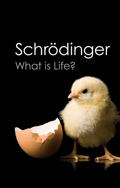 This month, EnCore book club attendees struggled with Erwin Schrodinger’s slim volume, What is Life?, a book that, as quoted in Goodreads, was “written for the layman, but proved to be one of the spurs to the birth of molecular biology and the subsequent discovery of DNA.”
This month, EnCore book club attendees struggled with Erwin Schrodinger’s slim volume, What is Life?, a book that, as quoted in Goodreads, was “written for the layman, but proved to be one of the spurs to the birth of molecular biology and the subsequent discovery of DNA.”
Erwin Schrodinger is an inescapable figure in Core’s Natural Science course, CC105; the Austrian physicist was instrumental to the study of quantum mechanics, and he is most well known for the paradoxical thought experiment that carries his name (and is efficiently summarized here). We were all intrigued as to what would it be like to read about biology from a physicist’s perspective.
The result was a bit lackluster. Why were most attendees less than enthusiastic? Was it simply a language barrier (Schrodinger himself apologizes for his English in the text)? Or perhaps it had to do with the nature of science writing in general? How simple is too reductive, and how complicated is too dense and difficult? Does a science writer need to relate every phenomenon to everyday life?
The EnCore book club is sending out request; please let us know what are the science books that you have most enjoyed, and that you would most recommend to the layman. Let us know, and join us next month at book club!
Next meeting, on March 5th, we shall be reading Sir Christopher Rick’s work, Milton’s Grand Style. Whether you get to read/finish/open the book at all or not, join us for free food and discussion at the Core office; don’t forget to BYOB if you are of age!
